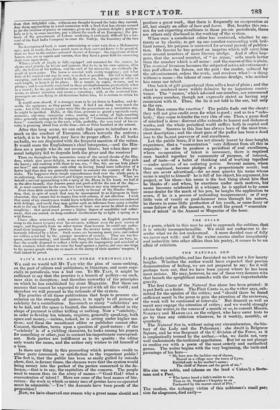TAIT'S MAGAZINE AND OTHER PERIODICALS.
WE said we would tell Mr. TAIT why the plan of name-seeking, on the part of editors and publishers, in literature, and more espe- cially in periodicals, was a bad one. To Mr. TAIT, it might be sufficient to say that the practice is a branch of puffery—as such, near akin to deception; and therefore unworthy of the principles on which he has established his stout Magazine. But these are reasons that cannot be expected to prevail with all the world ; and therefore we will proceed to the rationale of the system. The practice of all those publications that hope to procure cir- culation on the strength of names, is to apply to all persons of celebrity for a contribution. Inasmuch as many "celebrities" are to be had, and the space is limited, the inducement offered in the shape of payment is either trifling or nothing. Now a "celebrity," in order to develop his talents, requires, generally speaking, both space and money,—unless, indeed, he is acting under higher mo- tives; and these the mendicant editor or publisher cannot offer. Consent, therefore, turns upon a question of good-nature : if the "celebrity" is of a yielding character, he looks among his papers for something or other, just to content his importunate correspond- ent. Both parties are indifferent as to its quality : the editor only wants the name, and the author only wishes to rid himself of a bore.
Is there any thing in this proceeding which promises credit to either party concerned, or satisfaction to the expectant public? The fact is, that 'the public has been so easily gulled by outside show, that, informer times, the chances were that the system would bring money into the pocket of the parties concerned in the de- lusion,—that is to say, the capitalists of the concern. The people used to reason thus on the array of names—" Good God! what a concentration of talent ! Here are some of the best names of lite- rature: the work in which so many men of genius have co-operated must. be admirable."—Yes ! the Annuals have been proofs of the proposition! Now, we have observed one reason why a great name should not produce a great work,. that there is frequently no co-operation at all, but simply an affair of bore and boree. But, besides this rea- son for not expecting excellence in these pic-ffic periodicals, there are others only disclosed in the working of the system. When once a mendicant editor has contrived, whether by en- treaty or by charity,, to get up one number coruscating with limit names, his purpose is answered for several periods of publica- tion. He fancies he has gained an impetus which will carry hini over several numbers of mere literary sludge. And it often hap- pens, that the second number, of " no name," sells much better than the number which is all name : and the reason of this is plain. The nominal livraison becomes the subject of active advertisement: this puff affects the future, not the past : the reader, seduced by the advertisement, orders the work, and receives what ?—a thing without a name—the labour of some obscure drudge, who neither has name nor talent.
One batch of gilt gingerbread thus sells a host of plain ; and the cheat isrendered more widely delusive by an ingenious contri- vance. The "names," which adorned one number, are announced' with every number, though not expressly stated as having any connexion with it. Thus, the lie is not told to the ear, but only to the eye. But then comes the reaction. The public finds out the cheat they will not give credit even for what is good ; and as to a " brity," they come to loathe the very idea of one. Thus, a great deal of mischief is done : distrust alike extends to honest and dishonest works, and the whole periodical world suffers both in capital and character. Success in this line has always been of the most tran- sient description ; and the short gain of the puffer has been a dead. loss to the lu.nest purveyor of real excellence. Let the public learn, if it has not already learnt by dear-bought experience, that a " concentration " very different from All this is- requisite : in order to produce a periodical of real excellence,: where co-operation of talent is necessary, there is -reqffired men banded together by community of purpose, of interest,. and of taste—of a habit of thinking and of working together. —under motives of an enduring power. Several names, wheti thus combined, become pledges of a proportionate result; but they are never advertised,—for no man quacks his name whose name is aught to himself . he is full of his object, his argument, his project, or his ideas—his name is the last thing about him that he thinks of: and when, by exertions under such motives, his name becomes celebrated in a whisper, he is applied to by some name-dealer for the mark of his pen, he laughs the application to' scorn, if he is a person of unbending temperament; or if any little vein of vanity or good-humour runs through his nature, he throws in some little production of his youth, or some fancy or' some failure of an idle moment, to swell the grand " coneentra tion of talent" in the Annual or Magazine of the hour.


























 Previous page
Previous page